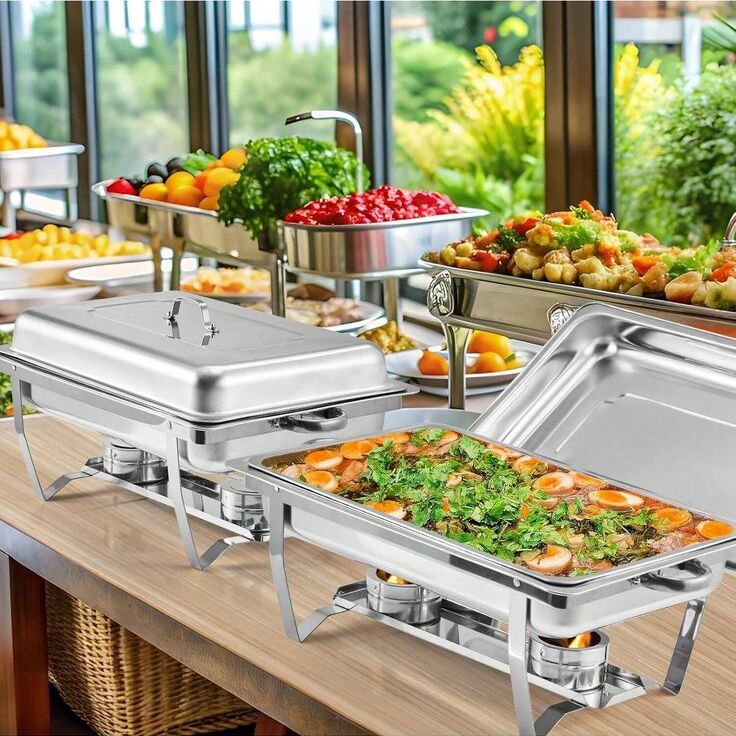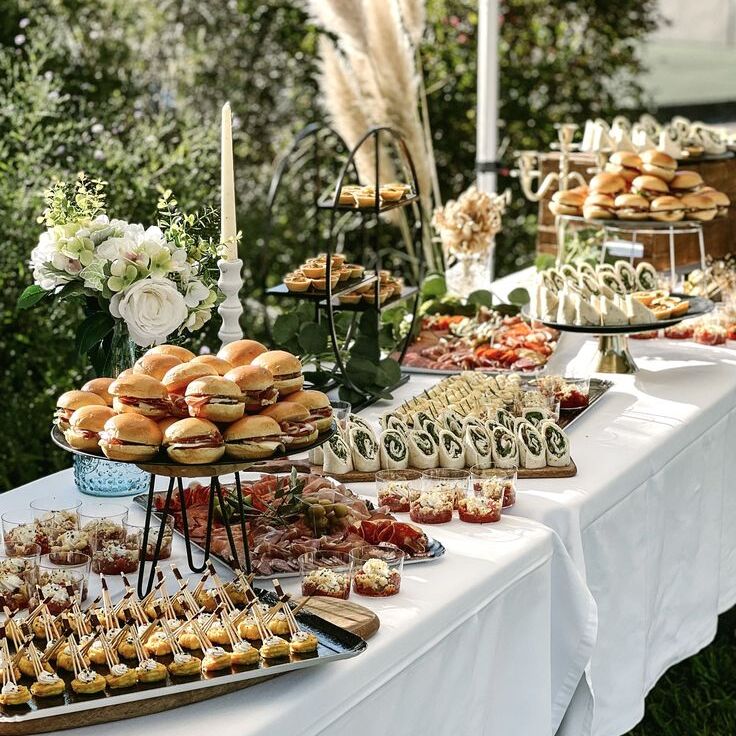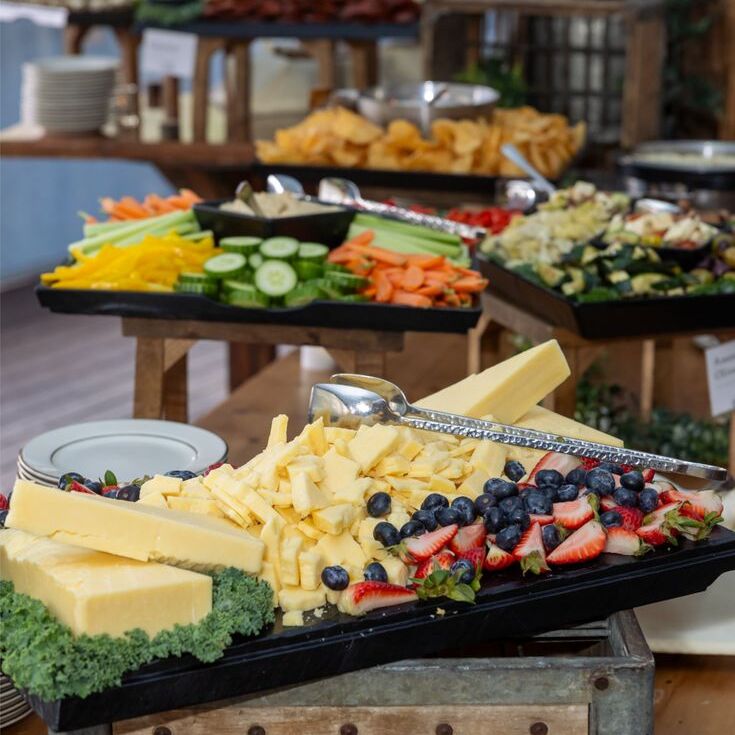The Importance of Choosing the Right Wedding Caterer
Selecting the right wedding caterer is critical for a memorable celebration. It impacts both guest satisfaction and your overall wedding budget. How much does wedding catering cost? Quality caterers provide delicious food and handle various details, easing your stress.
Experienced caterers not only prepare appetizing menus but also cater to individual preferences and dietary needs. This ensures all guests feel included. Proper catering can surprisingly save you money. It allows precise budget control and can reduce food waste significantly.

When searching for caterers, consider ones familiar with your venue. This familiarity aids smooth service delivery on your big day. Additionally, look for caterers who have strong customer feedback and those who offer detailed and transparent quotes, avoiding unexpected costs later.
Lastly, the right caterer will align with your wedding’s style and theme. They contribute to the atmosphere and experience at your reception. A good fit for your wedding catering needs ensures a joyful and hassle-free celebration for everyone involved.
Factors Influencing Wedding Catering Costs
Factors affecting wedding catering costs include guest count, menu complexity, and serving style.
Guest Count Considerations
The number of guests greatly impacts your catering costs. More guests mean more food, thus higher expenses. Strategically manage your guest list to control costs effectively.
Menu Complexity and Course Selection
A simple menu with fewer courses can be more cost-effective than an elaborate one. Complex menus typically require more ingredients and labor, increasing your catering costs.
Serving Style: Buffet vs. Plated Meals
Choosing between buffet and plated meals affects your budget. Buffets tend to be less expensive as they require fewer servers. However, plated meals offer a more formal dining experience. Consider your budget and wedding style when deciding.
Budgeting for Your Wedding Catering
When planning your wedding, setting a budget for catering is crucial. This step guides the rest of your decisions. Start by estimating the total cost based on guest count, menu complexity, and serving style. Use this as your guide through the catering process. Remember that how much wedding catering costs can differ greatly. Your budget should reflect your overall wedding finances and priorities.
Setting a Realistic Catering Budget
Determining a realistic catering budget can be challenging, but it’s essential. Take into account the number of guests, menu choices, and additional services. Consider what you can afford to spend per head. Work with your partner and perhaps a financial advisor, if necessary, to set a figure. This avoids financial strain and helps focus your caterer search.
Hidden Costs to Look Out For
Watch out for hidden costs in catering quotes. These could include service charges, setup and breakdown fees, and cake cutting costs. Be sure to ask about what’s included in the base price. Request a detailed quote from potential caterers. Check for extra charges for special requests or dietary accommodations. This ensures you won’t face unexpected bills later on.

Keeping Wedding Catering Affordable
Wedding catering can be affordable with the right strategies. Let’s explore how to keep costs down while providing a wonderful dining experience.
Utilizing Seasonal and Local Ingredients
Choosing local and seasonal ingredients helps reduce catering costs. These ingredients are often more affordable and fresher. They also support local farmers and reduce transportation overheads. Ask your caterer to prioritize these options in your menu.
Opting for Simpler, Quality Menus
Simple menus with fewer dishes require less labor and can be just as delightful. Focus on quality rather than quantity. Select a few exceptional dishes that impress guests without being elaborate or expensive. Discuss this approach with your caterer to ensure they align with your vision.
Negotiating with Caterers for Better Rates
Don’t hesitate to negotiate prices with caterers. Request details about package deals or off-peak discounts. Comparing quotes from different caterers can help leverage a better deal. Make clear what your budget limits are and ask them to work within those confines.
Special Dietary Considerations and Cost Implications
When planning wedding catering, accounting for various dietary needs is vital.
Catering for Different Dietary Requirements
Catering to all guests, some may have unique dietary needs. This includes vegan, gluten-free, or allergy-friendly options. Serving diverse dietary options can push up costs.
However, some strategies can manage the expenses. Firstly, communicate early with your caterer about these needs. They can then plan cost-effective dishes that cater to specific requirements. Use ingredients common to multiple diets to streamline the process and reduce costs.
Secondly, simplify special dishes. Creating intricate specialty meals for a few can be costly. Instead, go for simple yet elegant options that meet the dietary needs and are budget-friendly. And lastly, consider a separate buffet section. This can centralize special meals and reduce extra labor.
Including Halal Options without Escalating Costs
Including Halal options can be done without a significant price increase. A Halal-certified caterer simplifies planning. They ensure all food adheres to Islamic dietary laws.
To incorporate Halal food affordably, choose simple, high-quality Halal ingredients. This can cost less than more intricate Halal dishes. Also, consider the overall menu. If many guests require Halal meals, it might be more cost-effective to make the entire menu Halal.
Moreover, bulk purchasing ingredients certified as Halal can result in better rates from suppliers. Share your budget with the caterer to find a balance.
Together, these approaches can help you honor your guests’ dietary restrictions without straining your wedding budget.

Maximizing Your Catering Experience
Maximizing your catering experience involves two key elements: sufficient staff and a well-planned buffet layout.
Ensuring Adequate Staff for Service
To ensure smooth service, you need enough staff. Start by calculating the ideal guest-to-server ratio. Aim for one server for every 25 to 30 guests at a buffet. For plated meals, reduce this to one server for every 20 guests. When discussing your needs with a caterer, clarify how much staff will be included. It’s essential to adjust staffing based on your guest count and the service style. Remember, adequate staff leads to happy guests and a flowing event.
Efficient Buffet Layout to Minimize Waste and Cost
An efficient buffet layout can save money and reduce waste. Work with your caterer to design a buffet flow that makes sense. Place dishes sequentially, starting with appetizers and ending with desserts. Use signs to guide guests through the selections. Consider portion control to prevent waste. Also, use smaller plates. This encourages guests to take less food at once, reducing leftovers and cost. Make sure the buffet is accessible from both sides. This speeds up the line and keeps things moving.
By paying attention to these elements, you are ensuring a catering experience that’s both enjoyable and cost-effective.
Finalizing Your Wedding Catering Service
When all is set, finalizing your wedding catering service calls for timely actions and cautious reviews. This final step ensures you get the quality, service, and terms you’ve agreed upon.
Timeline for Booking and Tasting Sessions
Don’t delay arranging your booking and tasting sessions with your chosen caterer. Here’s a quick timeline:
- 10 to 12 months before: Start reaching out to preferred caterers.
- 8 to 10 months before: Schedule tasting sessions to sample menu items.
- 6 to 8 months before: Confirm your caterer and menu choices.
- 4 to 6 months before: Finalize and sign the catering contract.
Keep these dates in mind to avoid rushed decisions and ensure the best experience.
Thorough Review of Catering Contracts
Review contracts from caterers with care. Look for:
- Detailed breakdown of services and costs.
- Clarity on staffing, equipment, and overtime rates.
- Cancellation and refund policies.
- Specifics on setup and cleanup duties.
Ask questions if anything is unclear. Share the contract with a trusted friend or advisor for a second opinion. Confirming these details prevents last-minute surprises and keeps your wedding catering cost within budget.